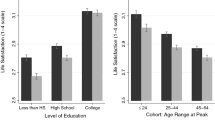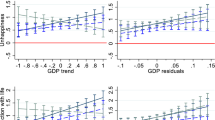Abstract
This paper tries to explain why unemployment has such a severe effect on the subjective well-being of people. It is already known that unemployed have among the lowest levels of subjective well-being of all people. This paper explains and tests why this is so. The explanation is based on the social production function theory. This theory states that ultimately people strive for physical well-being and social approval. Because unemployment affect both physical well-being and social approval its effect is so large. We elaborate this explanation to account for the differences between men and women. Because men and women have different ways of achieveing social approval unemployment is more detremental for men than for women. We further analyze differences between single men and women and married men and women to test the explanation that is put forward. Using the European Social Survey held in 2004 the hypotheses are tested. We do find that having a job is one of the main factors affecting subjective well-being, that this effect is bigger for men than for women and that women profit from the jobs of their partners whereas men do not.
Similar content being viewed by others
Notes
The number B24, as well as the other numbers refer to questions as they appear in the questionnaire.
All differences have been tested in a model that contains the interactions between gender and all other variables. When we write larger or smaller than the differences is significant at least at the 0.05 level.
The significance level is 0.06.
References
Artazcoz, L., Benach, J., Borrell, C., & Cortès, I. (2004). Unemployment and mental health: Understanding the interactions among gender, family roles, and social class. American Journal of Public Health, 94(1), 82–88.
Becker, G. S. (1965). A Theory on the allocation of time. Economic Journal, 75(299), 493–517.
Becker, G. S. (1993). A treatise on the family. Cambridge, MA: Harvard University Press.
Blanchflower, D. G., & Oswald, A. J. (2004). Well-being over time in Britain and the USA. Journal of Public Economics, 88(7–8), 1359–1386.
Boye, K. (2011). Work and well-being in a comparative perspective—The role of family policy. European Sociological Review, 27(1), 16–30.
Brereton, F., Clinch, J., & Ferreira, S. (2008). Employment and life-satisfaction: Insights from Ireland. Economic and Social Review, 39(3), 207–234.
Chadi, A. (2010). How to distinguish voluntary from involuntary unemployment: On the relationship between the willingness to work and unemployment-induced unhappiness. Kyklos, 63(3), 317–329.
Cinamon, R. G., & Rich, Y. (2002). Gender differences in the importance of work and family roles: Implications for Work, family conflict. Sex Roles, 47(11), 531–541.
Clark, A. E. (1997). Job satisfaction and gender: Why are women so happy at work? Labour Economics, 4(4), 341–372.
Clark, A. (2003). Unemployment as a social norm: Psychological evidence from panel data. Journal of Labor Economics, 21(2), 323–351.
Clark, A. E., Diener, E., Georgellis, Y., & Lucas, R. E. (2008a). Lags and leads in life satisfaction: A test of the baseline hypothesis. The Economic Journal, 118(529), F222–F243.
Clark, A. E., Frijters, P., & Shields, M. A. (2008b). Relative income, happiness, and utility: An explanation for the easterlin paradox and other puzzles. Journal of Economic Literature, 46(1), 95–144.
Clark, A. E., & Oswald, A. J. (1994). Unhappiness and Unemployment. Economic Journal, 104(424), 648–659.
Cole, K., Daly, A., & Mak, A. (2009). Good for the soul: The relationship between work, wellbeing and psychological capital. Journal of Socio-Economics, 38(3), 464–474.
Creed, P. A., & Bartrum, D. A. (2008). Personal control as a mediator and moderator between life strains and psychological well-being in the unemployed. Journal of Applied Social Psychology, 38(2), 460–481.
Deci, E. L., & Ryan, R. M. (2000). The “What” and “Why” of goal pursuits: Human needs and the self-determination of behaviour. Psychological Inquiry, 11(4), 227–268.
Di Tella, R., MacCulloch, R. J., & Oswald, A. J. (2003). The macroeconomics of happiness. The Review of Economics and Statistics, 85(4), 809.
Diener, E., Suh, E. M., Lucas, R. E., & Smith, H. L. (1999). Subjective well-being: Three decades of progress. Psychological Bulletin, 125(2), 276–302.
Dolan, P., Peasgood, T., & White, M. (2008). Do we really know what makes us happy? A review of the economic literature on the factors associated with subjective well-being. Journal of Economic Psychology, 29(1), 94–122.
Easterlin, R. A. (2005). In L. Bruni & P. L. Porta (Eds.), Building a better theory of well-being in economics and happiness—Framing the analyses (pp. 29–64). Oxford: Oxford University Press.
ESS Round 2: European Social Survey. (2004). ESS-2 2004 Documentation report, edition 3.1. Bergen, European Social Survey Data Archive, Norwegian Social Science Data Services.
Ferrer-i-Carbonell, A. (2005). Income and well-being: an empirical analysis of the comparison income effect. Journal of Public Economics, 89(5–6), 997–1019.
Fortin, N. M. (2005). Gender role attitudes and the labour-market outcomes of women across OECD countries. Oxford Review of Economic Policy, 21(3), 416–438.
Frank, R. H. (1985). Choosing the right pond: Human behavior and the quest for status. Oxford: Oxford University Press.
Frey, B. S., & Stutzer, A. (2002). What can economists learn from happiness research? Journal of Economic Literature, 40(2), 402–435.
Ganzeboom, H. B. G., & Treiman, D. J. (1996). Internationally comparable measures of occupational status for the 1988 international standard classification of occupations. Social Science Research, 25(3), 201–239.
Gruen, C., Hauser, W., & Rhein, T. (2010). Is any job better than no job? Life satisfaction and re-employment. Journal of Labor Research, 31(3), 285–306.
Hirsch, F. (1977). Social limits to growth. London: Routledge.
Hultman, B., Hemlin, S., & Hörnquist, J. O. (2006). Quality of life among unemployed and employed people in northern Sweden. Are there any differences? Work: A Journal of Prevention, Assessment and Rehabilitation, 26(1), 47–56.
Knabe, A., Rätzel, S., Schöb, R., & Weimann, J. (2010). Dissatisfied with life but having a good day: Time-use and well-being of the unemployed. The Economic Journal, 120(547), 867–889.
Korpi, T. (1997). Is utility related to employment status? Employment, unemployment, labor market policies and subjective well-being among Swedish youth. Labour Economics, 4(2), 125–147.
Latif, E. (2010). Crisis, unemployment and psychological wellbeing in Canada. Journal of Policy Modeling, 32(4), 520–530.
Layard, R. (2005). Happiness: Lessons from a new science. London: Allan Lane.
Lindenberg, S. M. (1991). Social approval, fertiltiy and female labor market behavior. In J. J. Siegers, J. DeJong-Gierveld, & E. Van Imhoff (Eds.), Female labour market behaviour and fertilty: A rational choice approach. Berlin: Springer.
McKeen, C. A. (2005). Gender roles: An examination of the hopes and expectations of the next generation of managers in Canada and China. Sex Roles, 52(7), 533–546.
Nieboer, A., Lindenberg, S., Boomsma, A., & Van Bruggen, A. (2005). Dimensions of well-being and their measurement: The SPF-IL scale. Social Indicators Research, 73(3), 313–353.
Nilson, L. B. (1976). The social standing of a married woman. Social Problems, 23(5), 581–592.
Ormel, J., Lindenberg, S., Steverink, N., & Verbrugge, L. (1999). Subjective well-being and social production functions. Social Indicators Research, 46(1), 61–90.
Ouweneel, P. (2002). Social security and well-being of the unemployed in 42 nations. Journal of Happiness Studies, 3(2), 167–192.
Powell, G. N., & Mainiero, L. A. (1992). Cross-currents in the river of time: Conceptualizing the complexities of women’s careers. Journal of Management, 18(2), 215–237.
Rainwater, L. (1994). Family equivalence as a social construction. In D. Ekert-Jaffe (Ed.), Standards of living and families: Observation and analysis (pp. 25–39). Montrouge, France: John Libbey Eurotext.
Sousa-Poza, A., & Sousa-Poza, A. A. (2000). Taking another look at the gender/job-satisfaction paradox. Kyklos, 53(2), 135–152.
Stanca, L. (2010). The geography of economics and happiness: Spatial patterns in the effects of economic conditions on well-being. Social Indicators Research, 99(1), 115–133.
Stokes, G., & Cochrane, R. (1984). A study of the psychological effects of redundancy and unemployment. Journal of Occupational Psychology, 57(4), 309–322.
Theodossiou, I. (1998). The effects of low-pay and unemployment on psychological well-being: A logistic regression approach. Journal of Health Economics, 17(1), 85–104.
Van der Lippe, T. (1993). Arbeidsverdeling tussen mannen en vrouwen. Amsterdam: Thesis publishers.
Van der Meer, P. H. (1993). Verdringing op de Nederlandse arbeidsmarkt: Sector- en sekseverschillen. Amsterdam: Thesis publishers.
Van der Meer, P. H., & Wielers, R. (2013). What makes workers happy? Applied Economics, 45(3), 357–368.
Welsch, H., & Bonn, U. (2008). Economic convergence and life satisfaction in the European Union. Journal of Socio-Economics, 37(3), 1153–1167.
Winkelmann, L., & Winkelmann, R. (1995) Happiness and unemployment: A panel data analysis for Germany. Konjunkturpolitik: Zeitschrift für angewandte Wirtschaftsforschung, 41(4), 293–307.
Acknowledgments
I thank Florian Hemme for his research assistance and Rudi Wielers for his comments.
Author information
Authors and Affiliations
Corresponding author
Rights and permissions
About this article
Cite this article
van der Meer, P.H. Gender, Unemployment and Subjective Well-Being: Why Being Unemployed Is Worse for Men than for Women. Soc Indic Res 115, 23–44 (2014). https://doi.org/10.1007/s11205-012-0207-5
Accepted:
Published:
Issue Date:
DOI: https://doi.org/10.1007/s11205-012-0207-5




